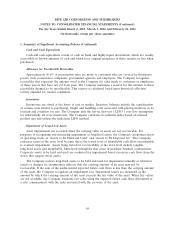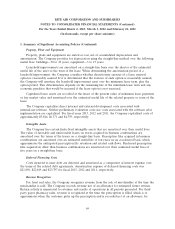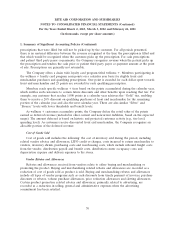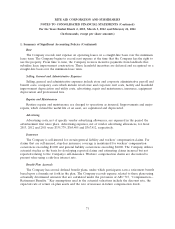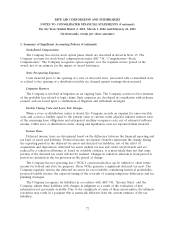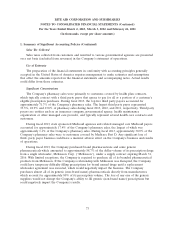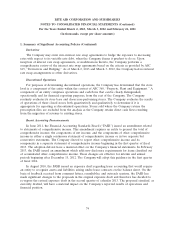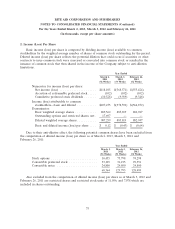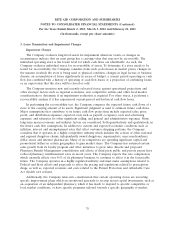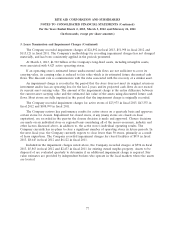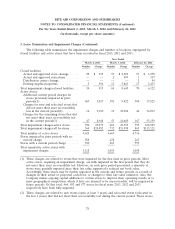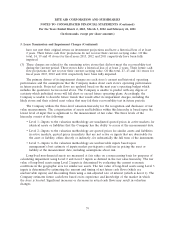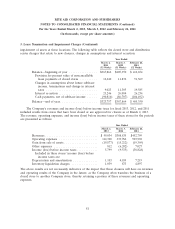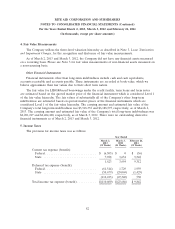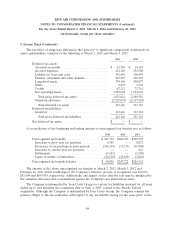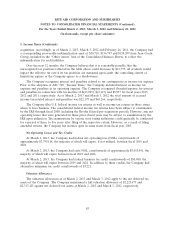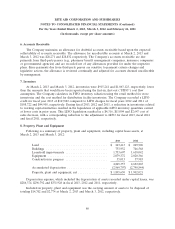Rite Aid 2013 Annual Report Download - page 78
Download and view the complete annual report
Please find page 78 of the 2013 Rite Aid annual report below. You can navigate through the pages in the report by either clicking on the pages listed below, or by using the keyword search tool below to find specific information within the annual report.RITE AID CORPORATION AND SUBSIDIARIES
NOTES TO CONSOLIDATED FINANCIAL STATEMENTS (Continued)
For the Years Ended March 2, 2013, March 3, 2012 and February 26, 2011
(In thousands, except per share amounts)
3. Lease Termination and Impairment Charges (Continued)
The Company recorded impairment charges of $24,892 in fiscal 2013, $51,998 in fiscal 2012 and
$115,121 in fiscal 2011. The Company’s methodology for recording impairment charges has not changed
materially, and has been consistently applied in the periods presented.
At March 2, 2013, $1.922 billion of the Company’s long-lived assets, including intangible assets,
were associated with 4,623 active operating stores.
If an operating store’s estimated future undiscounted cash flows are not sufficient to cover its
carrying value, its carrying value is reduced to fair value which is its estimated future discounted cash
flows. The discount rate is commensurate with the risks associated with the recovery of a similar asset.
An impairment charge is recorded in the period that the store does not meet its original return on
investment and/or has an operating loss for the last 2 years and its projected cash flows do not exceed
its current asset carrying value. The amount of the impairment charge is the entire difference between
the current asset carrying value and the estimated fair value of the assets using discounted future cash
flows. Most stores are fully impaired in the period that the impairment charge is originally recorded.
The Company recorded impairment charges for active stores of $23,973 in fiscal 2013, $43,353 in
fiscal 2012 and $108,999 in fiscal 2011.
The Company reviews key performance results for active stores on a quarterly basis and approves
certain stores for closure. Impairment for closed stores, if any (many stores are closed on lease
expiration), are recorded in the quarter the closure decision is made and approved. Closure decisions
are made on an individual store or regional basis considering all of the macro-economic, industry and
other factors discussed above, in addition to, the active store’s individual operating results. The
Company currently has no plans to close a significant number of operating stores in future periods. In
the next fiscal year, the Company currently expects to close fewer than 50 stores, primarily as a result
of lease expirations. The Company recorded impairment charges for closed facilities of $919 in fiscal
2013, $8,645 in fiscal 2012 and $6,122 in fiscal 2011.
Included in the impairment charges noted above, the Company recorded charges of $594 in fiscal
2013, $5,863 in fiscal 2012 and $2,433 in fiscal 2011 for existing owned surplus property. Assets to be
disposed of are evaluated quarterly to determine if an additional impairment charge is required. Fair
value estimates are provided by independent brokers who operate in the local markets where the assets
are located.
77



